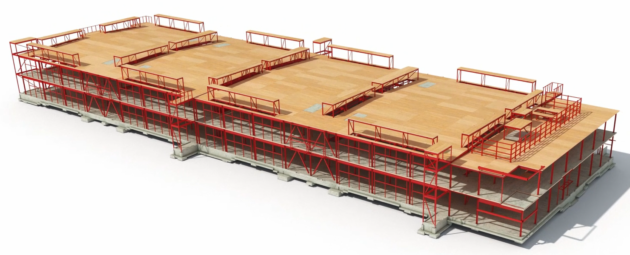
Microsoft is building a data centre with some cross-laminated timber (CLT) as it tries to become carbon-negative by 2030.
The demonstration project in northern Virginia will aim to use enough CLT in the building’s fabric to cut its carbon footprint 35% compared with a predominantly steel structure, and 65% compared with a mainly concrete version.
The CLT will be used to supplement concrete and steel in the floors of the two-storey building.
The company is also requiring high-volume suppliers to use 100% carbon-free electricity by 2030, and investing in low-carbon building materials, such as concrete that traps carbon dioxide and hydrogen-powered “green steel”.
In 2020, Microsoft set up a $1bn Climate Innovation Fund, which has invested $761m in scalable environmental projects.

It’s collaborating with Sweden’s Stegra, which is developing a hydrogen-fuelled steel-making process and Boston Metal, which uses renewable electricity to produce steel.
However, as a low-carbon building material, CLT is cheaper and easier to use than concrete or steel. The question Microsoft is trying to answer is how much can be added to a structure.
The idea, the company says, is to “displace a portion of the thick concrete typically used for flooring and ceilings.
“To ensure durability and waterproofing, a thin layer of concrete will be applied for reinforcement. Even including that thin protective layer, the result will be a much lighter building requiring far less steel, another factor reducing the embodied carbon of the building.”
- Watch a video explaining the concept:
David Swanson, a structural engineer who works on Microsoft data centre design, said the aim was to carry out a cost-benefit analysis.
“We’re constantly trying to validate the suitability of these novel materials for use in a data centre environment,” he said.
“We want to make sure that they’re going to perform, they’re going to be safe, they’re going to be resilient and provide all the features that we’ve grown accustomed to all these hundreds of years that we’ve been using those other materials.”
- Subscribe here to get stories about construction around the world in your inbox three times a week
Further reading:










